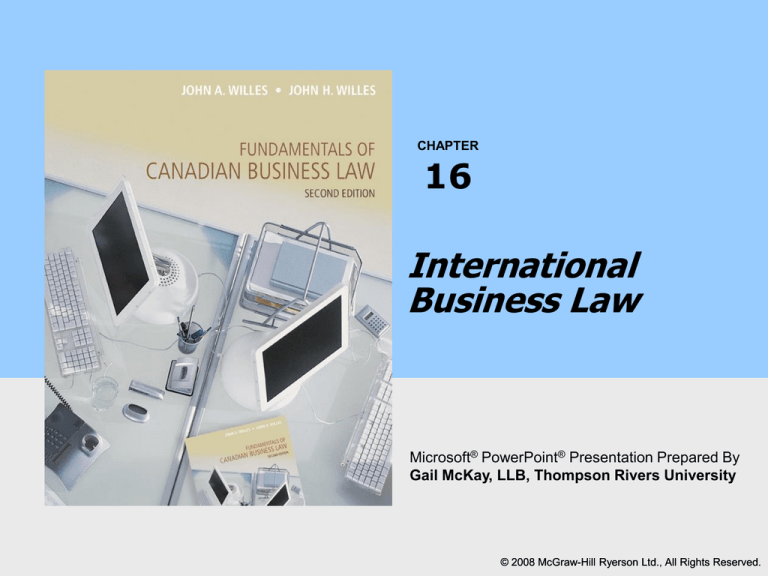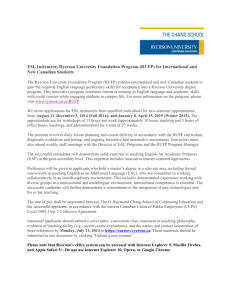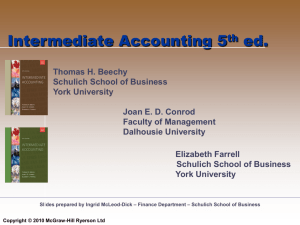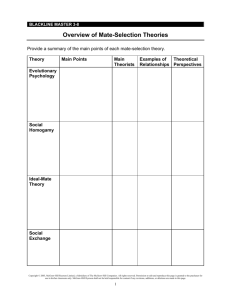
CHAPTER
16
International
Business Law
Microsoft® PowerPoint® Presentation Prepared By
Gail McKay, LLB, Thompson Rivers University
© 2008 McGraw-Hill Ryerson Ltd.
Ltd., All Rights Reserved.
OBJECTIVES
1. To survey international trade regulation
2. To outline the various forms of contracts
and international trade relationships
3. To examine the arbitration of international
trade disputes and the processes for
enforcement of them
Fundamentals of Canadian Business Law, Second Edition
© 2008 McGraw-Hill Ryerson Ltd. All Rights Reserved.
16-1
INTRODUCTION
Laws that apply to Canadian international
traders are legislation, various rules which
have been negotiated among trading nations,
and the law of contract; firms specializing in
international trade law are known as customs
brokers
Presently, the United States is Canada’s
biggest trading partner: in 2006, the US
imported $362 billion worth of Canadian goods,
or 70 percent of our exports; and Canada
imported $265 billion worth of American
goods, or 54 percent of our imports
Fundamentals of Canadian Business Law, Second Edition
© 2008 McGraw-Hill Ryerson Ltd. All Rights Reserved.
16-2
THE IMPORT OF GOODS INTO CANADA
Four statutes govern importing:
1. The Customs Act administers the powers of
customs officers and the collection of border
taxes
2. The Customs Tariff Act governs rates of
duty on goods brought into Canada
3. The Special Import Measures Act protects
Canada from the “dumping” of goods at a
price lower than in their country of origin
4. The Export and Import Permits Act limits
the import of very inexpensively produced
goods when Canadian companies cannot
competitively match the production price
Fundamentals of Canadian Business Law, Second Edition
© 2008 McGraw-Hill Ryerson Ltd. All Rights Reserved.
16-3
THE EXPORT OF GOODS FROM CANADA
Exporting is not regulated to the same degree
by Canadian law
Exporting creates jobs in Canada; therefore
exemptions from some legislation exist to give
more latitude to exporters – such as exemption
from the Competition Act prohibition against
conspiracy to fix prices
Although traders should expect to encounter
trade barriers, governments are working to
establish common frameworks for trade control
Fundamentals of Canadian Business Law, Second Edition
© 2008 McGraw-Hill Ryerson Ltd. All Rights Reserved.
16-4
INTERNATIONAL TRADE REGULATION
In 1948, Canada was one of 23 founding
members of the General Agreement on Tariffs
and Trade (GATT), among who principles are:
1. Encouraging trade through common and fair
rules in a system of non discrimination
2. Using most favoured nation status – giving
equally low rates of duty to all member
countries on all similar imports
3. Using national treatment - once goods are
inside the country, ensuring they are
treated as favourably as domestic goods
Fundamentals of Canadian Business Law, Second Edition
© 2008 McGraw-Hill Ryerson Ltd. All Rights Reserved.
16-5
INTERNATIONAL TRADE REGULATION
The World Trade Organization (WTO)
offers a dispute resolution and enforcement
system, and extends beyond the trade of
goods into services, intellectual property and
investment
The WTO accepts the terms of GATT, and
together the two systems provide an
organization for the reduction of trade barriers
Bilateral trade agreements regulate the flow of
specific goods between two nations, and often
have the benefit of licences or permits from
their respective governments
Fundamentals of Canadian Business Law, Second Edition
© 2008 McGraw-Hill Ryerson Ltd. All Rights Reserved.
16-6
FREE TRADE AGREEMENTS
Free trade agreements cover all sectors of
trade among participating nations
The North American Free Trade Agreement
(NAFTA) covers the US, Mexico and Canada
and encourages equal treatment of goods,
services, business travel and investment, as
well as covering issues of dumping, issues of
industries adversely affected by the agreement
and dispute resolution
Customs unions impose the same tariffs on
non members’ imports, providing a common
market with mobility of labour and capital
Fundamentals of Canadian Business Law, Second Edition
© 2008 McGraw-Hill Ryerson Ltd. All Rights Reserved.
16-7
SOCIAL AND MONETARY UNIONS
The European Union’s 25 member countries
have retained discrete national powers over their
own defence, tax and local affairs, but have
taken a collective approach to currency,
transportation, education and pensions
The Organization of Petroleum Exporting
Companies (OPEC), an oil trading cartel,
attempts to maintain effective price and
production agreements among its members
Under the Foreign Extraterritorial Measures Act
(FEMA), foreign judgments or legislation may not
be recognized by Canadian courts.
Fundamentals of Canadian Business Law, Second Edition
© 2008 McGraw-Hill Ryerson Ltd. All Rights Reserved.
16-8
GOVERNMENT ASSISTANCE
The Export Development Corporation is a
Crown corporation which provides insurance to
Canadian companies involved in international
business
Types of insured losses include those from a
war or revolution being declared, seizure of a
Canadian company’s foreign assets by a
foreign government or, similarly, prevention of
the transfer of money or assets out of the
country in question
Fundamentals of Canadian Business Law, Second Edition
© 2008 McGraw-Hill Ryerson Ltd. All Rights Reserved.
16-9
Fundamentals of Canadian Business Law, Second Edition
© 2008 McGraw-Hill Ryerson Ltd. All Rights Reserved.
16-10
INTERNATIONAL TRADING RELATIONSHIP
EXAMPLES of long term international business
relationships include:
1.
2.
3.
4.
5.
6.
Occasional direct exports of goods
Foreign distribution or exporting of goods
Licences to produce goods abroad
Joint ventures abroad
Foreign branch or sales subsidiary
Service such as management or advising
Fundamentals of Canadian Business Law, Second Edition
© 2008 McGraw-Hill Ryerson Ltd. All Rights Reserved.
16-11
FOREIGN DISTRIBUTION AGREEMENTS
Distribution agreements involve a Canadian
exporter contracting with a foreign buyer who
has the exclusive right to sell in a specific
territory, and who is obligated to provide sales
staff, marketing, and service of equipment
In return, the Canadian exporter is obligated to
allow use of the trade name and advertising
materials, supply the goods and replacement
parts, and provide advice of a technical nature
Force majeure and arbitration clauses are often
included to cover unexpected events
Fundamentals of Canadian Business Law, Second Edition
© 2008 McGraw-Hill Ryerson Ltd. All Rights Reserved.
16-12
LICENCE AGREEMENTS
A licence agreement is a right of a foreign
company to manufacture a protected product
in the foreign jurisdiction – usually a product
with a registered trademark, patent, industrial
design or copyright
In return for this right, the Canadian company
receives a royalty, but has little direct control
over the efficiency of either the foreign
production plant itself or its sales personnel
Fundamentals of Canadian Business Law, Second Edition
© 2008 McGraw-Hill Ryerson Ltd. All Rights Reserved.
16-13
INTERNATIONAL JOINT VENTURES
Joint ventures may be unincorporated
contractual arrangements, or incorporated in
the foreign jurisdiction – in which case each of
the parties is a shareholder in the corporation
Some foreign governments may require that
the share of the foreign jurisdiction be a
controlling interest; nevertheless, control may
be maintained to some extent by keeping the
accomplishment of one or more critical
manufacturing steps in Canada
Fundamentals of Canadian Business Law, Second Edition
© 2008 McGraw-Hill Ryerson Ltd. All Rights Reserved.
16-14
BRANCH PLANTS OR SUSIDIARIES
A foreign branch plant or subsidiary has
the advantage of offering the Canadian
company more control over efficiency,
profitability, and marketing
It has the disadvantages of requiring the
commitment of capital to set up and requiring
a higher level of knowledge about the law in
order to carry on business in the foreign
jurisdiction
Fundamentals of Canadian Business Law, Second Edition
© 2008 McGraw-Hill Ryerson Ltd. All Rights Reserved.
16-15
INTERNATIONAL CONTRACTS OF SALE
A contract of sale for export consists of four
core documents as well as other supporting
documentation:
1.
2.
3.
4.
The
The
The
The
contract of sale
bill of lading
insurance contract
commercial invoice
A guarantee with the Export Development
Corporation and a financing agreement are
usually part of the package as well
Fundamentals of Canadian Business Law, Second Edition
© 2008 McGraw-Hill Ryerson Ltd. All Rights Reserved.
16-16
CONTRACT OF SALE
Trade terms in contracts of sale must have
the same meaning to both parties and may
make reference to the International Chamber
of Commerce trade terms for definitions
The laws which will govern the contract should
be specified – especially those associated with
the offer, when it may be revoked, or when it
may expire; further, the time when title to the
goods will pass should be very clearly specified
The United Nations Vienna Convention on
Contracts for International Sale of Goods
(CISG) can be used to imply missing terms
Fundamentals of Canadian Business Law, Second Edition
© 2008 McGraw-Hill Ryerson Ltd. All Rights Reserved.
16-17
BILL OF LADING
The contract between the seller and carrier
is the bill of lading – in which the bailee has
the obligation to delivery the goods to the
buyer consignee when the consignee presents
a copy of the bill of lading
The bill of lading therefore represents a title
document
A bill of lading may have a sight draft attached
to it to ensure payment of the seller before
delivery to the buyer
Fundamentals of Canadian Business Law, Second Edition
© 2008 McGraw-Hill Ryerson Ltd. All Rights Reserved.
16-18
INSURANCE & COMMERCIAL INVOICE
A contract for cargo insurance should be in
place during the shipment of goods because of
the inherent risks of loss or damage, and in
some countries political risk insurance is also
advisable
A commercial invoice will be required by the
customs official in the purchaser’s jurisdiction
in order to calculate how much duty is owed on
the shipment
Fundamentals of Canadian Business Law, Second Edition
© 2008 McGraw-Hill Ryerson Ltd. All Rights Reserved.
16-19
INTERNATIONAL LAW: JURISDICTION
To create jurisdiction so that a court will
hear a lawsuit, a connection to the business,
person or property must be established such
as the physical presence of a person or his or
her habitual residency
“Long arm statutes” also achieve jurisdiction if:
1. Resident, but presently outside the country
2. An absent person committed a tort while
inside the country
3. Parties to contracts that were to have been
performed inside the country by persons
now absent
Fundamentals of Canadian Business Law, Second Edition
© 2008 McGraw-Hill Ryerson Ltd. All Rights Reserved.
16-20
INTERNATIONAL LAW: JURISDICTION
A judicial analysis undertaken to determine
what court should hear a lawsuit involves
considerations of forum non conveniens which
try to balance the interest of the public and the
interest of each of the parties in a particular
jurisdiction
At the time of contract formation, parties to an
international agreement should specify their
choice of applicable law in the event of a future
trade dispute, and their choice will usually be
respected by the courts
Fundamentals of Canadian Business Law, Second Edition
© 2008 McGraw-Hill Ryerson Ltd. All Rights Reserved.
16-21
RECOGNITION & ENFORCEMENT
Recognition of a foreign judgment means a
legal decision from another jurisdiction is
affirmed in the second jurisdiction
Enforcement means a recognized judgment will
have access to the same resources of the host
state to help the plaintiff realize on the
judgment as he or she would have if the
judgment came from the host state’s court
Defences include no proper jurisdiction,
proceedings that are against public policy, and
no recognition of judgment’s penal component
Fundamentals of Canadian Business Law, Second Edition
© 2008 McGraw-Hill Ryerson Ltd. All Rights Reserved.
16-22
ARBITRATION OF A TRADE DISPUTE
Commercial arbitration is regularly
incorporated into international contracts to
avoid having to litigate in court, and the panel
of arbitrators often has expertise in the type of
trade or business involved – leading to quick,
effective and private dispute resolution
If the parties have not specified a location for
arbitration or the governing law, the United
Nations Commission on International Trade
Law (UNCITRAL) rules for arbitration may be
applied
Fundamentals of Canadian Business Law, Second Edition
© 2008 McGraw-Hill Ryerson Ltd. All Rights Reserved.
16-23
ENFORCEMENT OF ARBITRATION AWARDS
Most countries enforce arbitrations
according to their national laws, but model
codes can be referenced or adopted such as
the following codes and conventions, all
adopted by Canada:
United Nations Commercial Arbitration Code;
United Nations Convention on the Recognition
and Enforcement of Foreign Arbitral Awards;
and the Vienna Sales Convention
Fundamentals of Canadian Business Law, Second Edition
© 2008 McGraw-Hill Ryerson Ltd. All Rights Reserved.
16-24
SUMMARY
Importing goods is governed by four major
statutes; more latitude is allowed for exporting
International trade agreements such as GATT
and the WTO encourage fair trade practices
and offer dispute resolving mechanisms
Distribution agreements, operation of branch
plants, joint ventures, and licensing
agreements are examples of the various forms
of international trade relationships
Commercial arbitration of trade disputes avoids
jurisdiction and other problems with courts
Fundamentals of Canadian Business Law, Second Edition
© 2008 McGraw-Hill Ryerson Ltd. All Rights Reserved.
16-25





